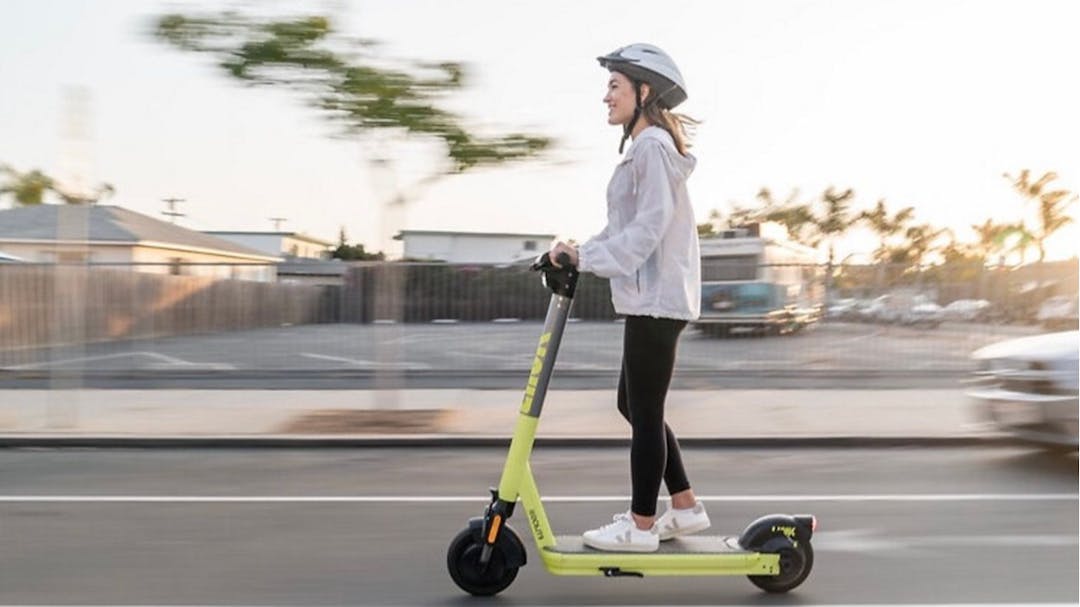E-Scooter Pilot Program
Consultation has concluded

The E-Scooter Pilot Program has concluded. To learn more about E-Scooters in Eugene, please visit the City's Bikes and Scooters webpage.
The E-Scooter Pilot Program Six-Month Survey is Now Closed.
The City of Eugene is evaluating the impacts of the Electric Scooter Pilot Program. More than 1,160 people particpated in the six-month survey between August 31 and October 9, 2023. Staff are currently analyzing the results and will share the findings later this Fall.
More About the Six-Month Survey
The City of Eugene is not taking the introduction of e-scooters to our transportation system lightly. We know they are a powerful tool for meeting our climate recovery, mode-shift, and equity goals. We also know that Eugene's community may have experienced challenges with the e-scooter program. To ensure that we're making informed decisions about the program's future, we're committed to evaluating the program’s impact on safety, sustainability, accessibility and equity.
The survey will help staff understand how e-scooters are being used, how they might be contributing to transportation choice and mode shift, community perspective on the program, and perceptions of safety and accessibility. Data collected will be shared with the public later this Fall. The insights we gather during the one-year pilot will aid us and City leadership in making informed decisions regarding the future of micromobility in Eugene. Overall, the upcoming evaluation will help staff determine if the e-scooter program is contributing to a transportation system that meets the needs of all residents while ensuring a sustainable and equitable future.
To learn more about the program, please visit the City's e-scooter webpage.
Evaluation Process
Eugene's electric scooter pilot program kicked off this past March. With over 125,000 trips made in the first 5 months, we've learned a lot already. To ensure that we're making informed decisions about the program's future, we're committed to evaluating the program’s impact on safety, sustainability, accessibility and equity. Read on for an overview of the evaluation process.
Mode Choice and Sustainability
Data reported in monthly reports to city staff from Superpedestrian, the company responsible for providing the shared e-scooters, will be used to complement data gathered from the six-month survey. For example, when assessing the sustainability of shared e-scooters, staff will analyze data reported by Superpedestrian on the energy/fuel consumed during deployment, rebalancing, charging, and maintenance processes. This data will supplement survey responses to questions on transportation choices before and after scootershare introduction.
Equity
Evaluation of equity will include monthly data reported by Superpedestrian on the usage of the low-income service-rate plans (called LINK-Up), education and outreach efforts, and the usage of the program by unbanked individuals or those without smartphones. City staff will collect data to analyze the program's usage by geography, including trip origins and destinations, and its correlation with parking hub locations. Demographic information collected from user surveys, such as age, race, sex, and income, will help identify any potential disparities in access and usage.
Safety and Accessibility
Safety and accessibility evaluation will assess safety reports from Superpedestrian that summarize user-involved collision and injury incidents, complaints received, customer service responses, penalties issued to users, maintenance logs, and efforts related to education and outreach. The program will also consider incident reports from the Eugene Police Department (EPD) and medical reports, in addition to survey questions about e-scooter parking and riding behavior, such as helmet usage and sidewalk riding.
Program Background
What is Happening?
In 2019, the City of Eugene began work to plan for and establish a shared e-scooter pilot program. The program is planned to launch Spring 2023. Program creation included:
- Updating city code to include a definition for "micromobility devices" and to allow the use of micromobility devices on shared-use paths
- Establishing criteria based on best practice research and community input to determine top candidate e-scooter companies (Safety, Sustainability, and Equity)
- Releasing a Request for Information for e-scooter services from interested e-scooter companies
- Drafting and adopting an Administrative Rule that regulates where and how e-scooter companies may operate their devices
- Executing an application process for issuing a Shared Micromobility Service License
Why is this Happening?
The City of Eugene has multiple policies in place that support the creation of a shared e-scooter program. Eugene’s Climate Recovery Ordinance states that by 2030 community fossil fuel use should fall to 50% of 2010 levels. Additionally, both the city’s 20-year long range land use (Envision Eugene) and transportation plans (Eugene 2035 Transportation System Plan) state that the number of trips made by transit, bicycling, or walking should be tripled.
It should be noted that when these plans were created, e-scooters did not yet exist. The intention of increasing the number of transit, bicycling, and walking trips, however, is to reduce the number of trips made by gasoline (fossil fuel) consuming, single-occupancy vehicles. E-scooters present an additional opportunity for the city to provide a method of moving people in a fun and accessible way that does not require the use of personal vehicles. In short, e-scooters could help reduce vehicle use, which in turn would reduce fossil fuel use, which in turn would help to achieve the Climate Recovery Ordinance goals.
Micro-mobility – What is It and Why Should I Care?
At its core “micro-m obility” means just what its name says – mobility options that are small. The National Association of City Transportation Officials (NACTO), defines it as “small, fully or partially human-powered vehicles such as bikes, e-bikes, and e-scooters.”
obility” means just what its name says – mobility options that are small. The National Association of City Transportation Officials (NACTO), defines it as “small, fully or partially human-powered vehicles such as bikes, e-bikes, and e-scooters.”
This definition offers a lot of lee-way for interpretation. As such, the City of Eugene has created its own definition for “micro-mobility” in order to write new city code that will allow e-scooter use within city boundaries. The definition is flexible enough to cover the next new “micro” transportation technology that arises, so long as it lightweight and human or electric-powered.
Shared micromobility device. A lightweight vehicle that: (a) Is no more than 3 feet wide; (b) Can be propelled by electric propulsion, human propulsion, or both; (c) If being propelled by electricity, is capable of traveling at no more than 20 miles per hour; and (d) Is made available for rent or public shared use in the public right-of-way.




